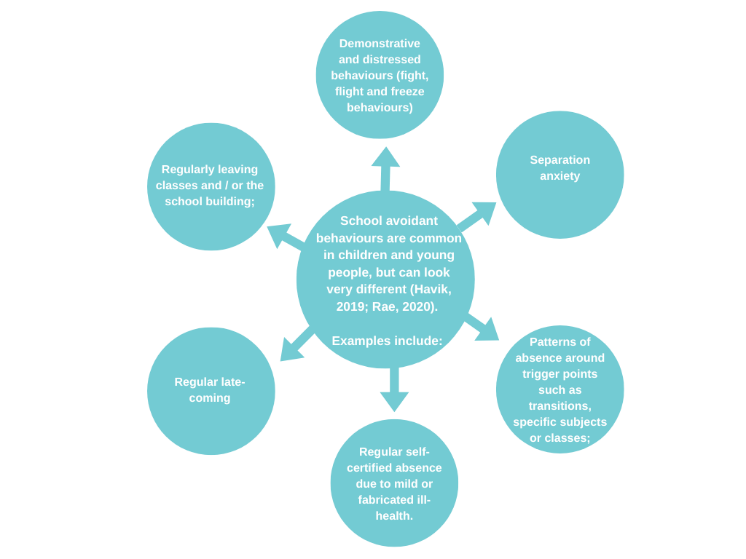Every episode of school absence carries a risk to the fulfilment of a learner’s potential (Havik, 2019). Problematic school absence is a long-standing issue within education (Lachlan, 2003) and will be seen in every area of our community for a wide range of reasons. In some cases, practitioners may encounter intergenerational patterns where families and communities feel less connected to education and school life (Kearney, 2021). In others, practitioners may find that emotional and mental wellbeing or neurodiversity lie at the heart of the challenge, and school doesn’t feel like a safe, secure and nurturing place to be. Whatever the reason, the evidence suggests that the pandemic has created greater vulnerability and risk for children, young people and families who are faced with these challenges (Phelps & Sperry, 2020).
Many of these behaviours, whilst concerning, are often addressed effectively by schools through routine monitoring and support procedures. However in some cases, they can develop into severe and prolonged periods of absence that become problematic. There is inconsistency in how problematic absence is defined within the literature, as the behaviours are varied and the reasons behind them are complex (Gallé-Tessonneau et al.,2019; Childs & Lofton, 2021) Appendix A. That said, there is now widespread recognition that almost all problematic absence is driven by a person’s emotional wellbeing (Kearney & Graczynk, 2020; Rae, 2020).
Understanding problematic school absence as a symptom of an emotional wellbeing need makes it possible to focus on:
- Risk and resilience factors;
- Reasons for the non-attendance;
- Specific practices and tools for assessment;
- Robust planning and effective prevention and response strategies.
These will all help practitioners manage this highly complex and challenging area of educational practice (Rae, 2020).
In East Renfrewshire, we will use the term Emotionally Based School Absence (EBSA), defined as:
“A pattern of behaviours indicating that a child or young person is not attending school due to underlying emotional reasons. These reasons can be due to factors within and out-with the school environment.”
This definition encourages a balanced, careful assessment of the interaction between the environmental conditions and relationships we create for children and young people, as well as the decisions they make because of their school experience.
Emotional Based School Absence (ESBA) is understood as the way in which a child or young person communicates that their underlying emotions and level of connectedness are not supporting their school engagement and attendance (Albano & Kearney, 2018). Where EBSA becomes frequent and sustained over time, it can have a detrimental impact on the child or young person’s social and emotional development, as well as their learning (Aqeel & Renna, 2021).
This is closely associated with poorer outcomes, including:
- Lower levels of attainment;
- Relationship difficulties;
- Difficulty mastering emotions in challenging situations;
- Difficulty sustaining positive destinations such as further education, employment or training;
- Increased likelihood of poor mental health and wellbeing;
- Increased risk of offending behaviour;
- Reinforcement of intergenerational cycles of low expectation, engagement and attendance;
- Increased risk of socio-economic deprivation;
- Anxiety for parents / carers and siblings, causing tension, arguments and relationship challenges within the family.
Practitioners can also feel worried and at times burdened by their responsibility to try to improve the situation. By developing a good understanding of the risk factors that contribute to EBSA, practitioners can improve their preventative and responsive practice with confidence.


